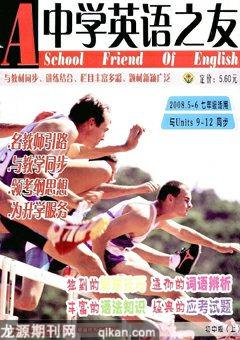新目标七年级下Units9-12正误例析
董明义
1. 上周末他们去海滩了。
[误] They go to the beach last weekend.
[正] They went to the beach last weekend.
[析] 句中有了明显的表示过去时间的状语last weekend,所以,谓语 动词要用一般过去时。
2. 我父亲给我做了晚饭。
[误] My father cooked dinner to me.
[正] My father cooked dinner for me.
[析] 介词for的意思是“为……”,表示对象,一般与动词make, cook, get, buy等连用。介词to表示“给……”的意思,一般与动词give, show等连用。
3. 和我们一起去游泳怎么样?
[误] What about go swimming with us?
[正] What about going swimming with us?
[析] What about…?的意思是“……怎么样?”,常用来征询对方的建议、意见、看法等,介词about后面可接名词、代词或动词-ing形式。
4. 你每天早晨练习说英语吗?
[误] Do you practice to speak English every morning?
[正] Do you practice speaking English every morning?
[析] practice是及物动词,后面可接名词、代词作宾语;接动词作宾语时,要用动词-ing形式,不可用动词不定式。
5. 现在是上学的时间了。
[误] Its time go to school now.
[正] Its time to go to school now.
[析] Its time to do sth.是一个固定句型,意思是“是/该做某事的时候了”。也可用“Its time for+名词”。例如:Its time for class. 该上课了。
6. 孩子们在操场上玩得很高兴。
[误] The children had great fun to play on the playground.
[正] The children had great fun playing on the playground.
[析] have fun doing sth.是一个固定结构,意思是“做某事很愉快”,其中fun是不可数名词。
7. 那儿的人们非常友好。
[误] The people there was very friendly.
[正] The people there were very friendly.
[析] 当people作“人、人们”讲时,是集体名词,具有复数意义,作主语时谓语要用复数形式。
8. 你们去哪儿度假了?
[误] Where did they go for vacation?
[正] Where did they go on vacation?
[析] on vacation是固定用法,意思是“度假、在休假中”,常用于美国英语中。
9. 我们决定下午打网球。
[误] We decide playing tennis this afternoon.
[正] We decide to play tennis this afternoon.
[析] 动词decide后面要接带to的动词不定式作宾语,不可接动词-ing形式。
10. 王老师有一个八岁的男孩。
[误] Mr. Wang has a 8-years-old boy.
[正] Mr. Wang has an 8-year-old boy.
[析] “数词+名词+形容词”构成的复合形容词,中间要用连字符号“-”,且名词要用单数形式。不定冠词a与an的选用,要根据数词的第一个音素来判断。
11. 在学校里我们有太多的规章制度。
[误] We have too much rules at school.
[正] We have too many rules at school.
[析] too many与too much都可表示“太多”的意思,但too many后面要接可数名词的复数形式,too much后面接不可数名词。

